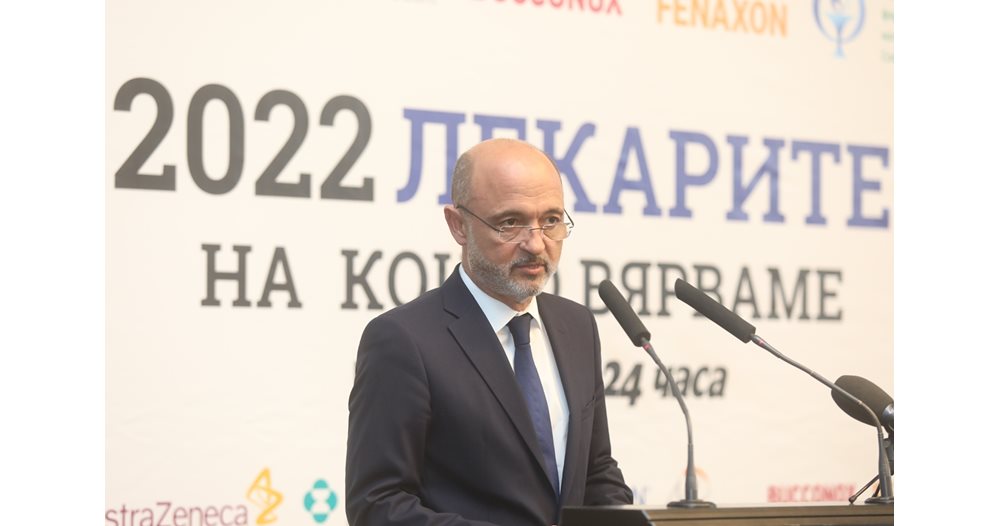- “Pfizer” reschedules the deliveries, but demands money for the undelivered doses
- The company is still renegotiating the unproduced ones
Bulgaria did not participate in determining the number of vaccines against COVID-19 to be delivered to us. Only 5 Member States set the quantities according to the population of each country. A rather large amount is planned for Bulgaria – by June we need to buy another 7 million doses of vaccines.
This was announced by the Acting Minister of Health Asen Medzhidiev. This is how he explained why he insisted to the European Health Commissioner Stella Kyriakides to terminate the contract with Pfizer.
To date, Bulgaria has discarded 2.8 million doses of vaccines. In the coming months
another 2.5 million doses will be out of date
Over 1 million doses were prepaid in May. I delayed their delivery so as not to scrap them as well. In reality, we will pay huge amounts to destroy them, the health minister told bTV yesterday.
Our country does not have the right to resell vaccines, but it can donate them. However, nobody wants them, the minister revealed. To which countries and how much has Bulgaria donated so far – see in the infographic.
Therefore, Dr. Medzhidiev raised the question at the regular meeting of the Council of the European Union on employment, social policy, health care and consumer affairs in Brussels. He proposed to terminate the contract with “Pfizer” or to order specific quantities according to the needs of each country and to make the payment after the delivery, as well as not to pay compensation.
There was also another unacceptable contract – to reduce the quantities, but to pay the so-called fee flexibility as a penalty. Bulgaria had to pay a huge amount. “I’m not allowed to say the numbers, but
with this money the children’s hospital can be built
I am the Minister of Health and I have to protect Bulgarian interests. I have never been anti-vaxxer, on the contrary. I will not allow us to pay huge sums of money to destroy vaccines”, Minister Medjidiev was categorical. He clarified that many of the member states are also producers and the interests are different. Bulgaria is only a consumer. And he invited Pfizer as a manufacturer to show solidarity.
The vaccines had not yet been produced, so the loss would not be total, the minister believes.
“Pfizer” tended to deliver fewer COVID vaccines on a rescheduled basis, but for now there is no prospect of the pharmaceutical giant accepting the demands of Bulgaria and other EU countries to terminate the contract or reduce the quantities without compensation, it became clear after the request of Minister Medzhidiev.
“Working together, we have achieved significant reductions in doses, flexibility in the delivery schedule and security in case more doses are needed. What we have achieved in our negotiations is an important improvement, which goes in the direction of what most member states asked for,” European Health Commissioner Stella Kyriakides told “24 Chasa”.
The pharmaceutical company offered to reduce the number of doses delivered by 40% and delay their delivery, but
to be paid for the ordered doses that will never be produced,
it became clear last week. However, Dr. Asen Medzhidiev did not like the conditions.
In addition to Bulgaria, Poland, Hungary and Lithuania are also against the proposed deal for the surplus of vaccines.
As of mid-January 2023, Bulgaria ranks last for vaccine doses in Europe – 67.9 per 100 people, according to the latest Statista data. The other member states opposing Pfizer’s proposal are slightly ahead of us – Poland reports 145.1 doses per 100 people, Lithuania – 165.1, and Hungary, whose data, however, are from the end of 2022. – 167.5.
First in the ranking is Portugal with 272.7 doses per 100 people, followed by Malta – 258.4; Belgium – 253.8; and Italy with 243.2.
It is not yet clear whether Pfizer will agree to the conditions proposed by the states in the future. “Negotiations with the company regarding the delivery of doses are being conducted by the negotiation team, made up of representatives of the EC and several member states,” European Commissioner Kyriakides also explained to “24 Hours”.
“All countries in the EU are fully aware of the contractual conditions, including for supplies, and have agreed on them with the companies. This also applies to subsequent amendments that delay deliveries. Discussions on the preliminary agreement reached between the joint negotiation team and “Pfizer” continue with the EU countries within the framework of the Management Board. We cannot say more given the ongoing discussions,” she said.
The European Commission explains that the development and implementation of vaccination strategies is the responsibility of the countries. They wear
full responsibility for administration of delivered doses
vaccines, as well as the responsibility to avoid expiration of doses.
Countries decide what to do with the doses: administer them to their own citizens, stockpile vaccines for possible future waves or donate them to third countries, the health commissioner explains. According to her, vaccination is a national competence and in the EU they do not have a specific monitoring mechanism regarding the expiration of the expiration date or the non-use of the doses.


